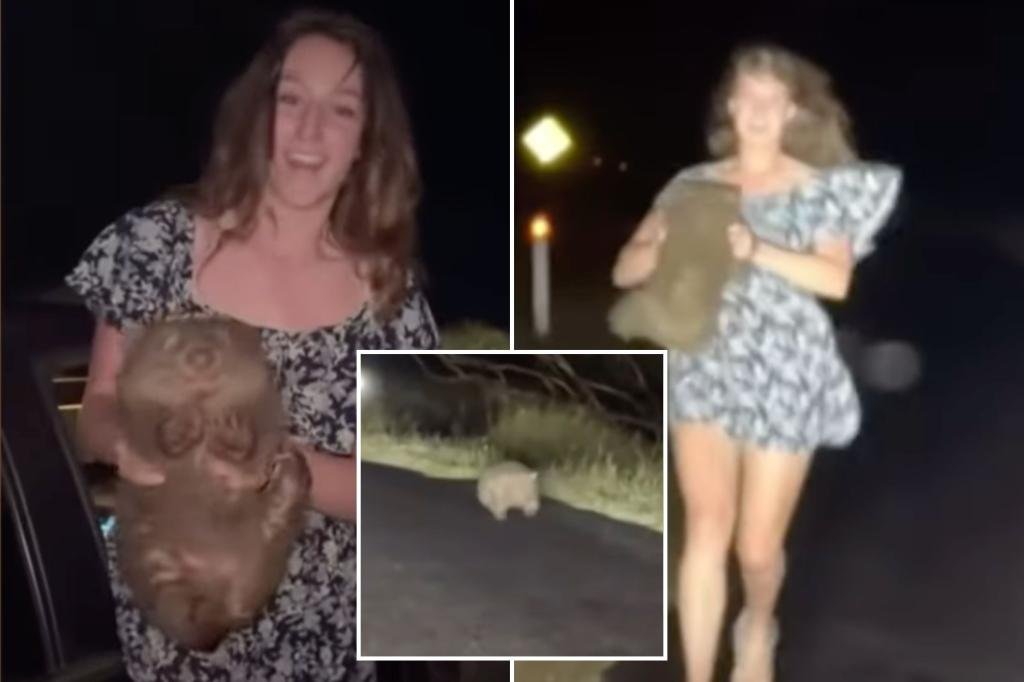
Influencer Sparks Outrage in Australia After Taking Baby Wombat from Its Mother
Sam Jones, a U.S.-based social media influencer and self-described “outdoor enthusiast and hunter,” has ignited widespread backlash in Australia after sharing a video of herself taking a baby wombat, or joey, away from its distressed mother. The incident, which occurred on a rural road at night, led to calls for her deportation, condemnation from Australian officials, and criticism from wildlife organizations.
The now-deleted video shows Jones running across a dark road toward her car while holding the squirming joey. The baby wombat hisses and struggles in her grasp as its mother chases after her. Jones enthusiastically exclaims, “I caught a baby wombat,” while the man filming laughs and remarks, “Look at the mother—she’s chasing after her!” Moments later, Jones places the joey back on the roadside, leaving viewers uncertain whether it was reunited with its mother.
While Jones initially captioned the video with excitement about fulfilling her dream of holding a wombat, she later deleted the post amid mounting criticism. Wildlife experts warned that her actions could have caused significant distress to both the joey and its mother, potentially putting the baby wombat at risk of becoming roadkill.
In response to the backlash, Jones issued a lengthy statement on Instagram apologizing for her actions. She explained that she encountered the wombats on the road and wanted to ensure their safety by removing them from traffic. According to Jones, she picked up the joey because it wasn’t moving and feared it might be sick or injured. She claimed that she ran away from the mother out of fear that it might attack her.
“The snap judgment I made in these moments was never from a place of harm or stealing a joey,” she wrote. “While I was unbelievably excited to see such an amazing animal, I looked it over quickly and immediately returned it to its mother. I ensured that they reunited and got off the road.”
Jones admitted that she acted too hastily in the moment and failed to provide adequate context for viewers online. She emphasized that the incident was not staged or intended for social media likes but acknowledged that she did not handle the situation as well as she should have.
“I have done a great deal of reflection on this situation and have realized that I did not handle this situation as best as I should have,” she added. “I am truly sorry for the distress I have caused.”
The video sparked outrage among Australians, with Prime Minister Anthony Albanese calling Jones’s actions “simply outrageous.” He sarcastically suggested that Jones try taking a baby crocodile from its mother to see how she fares. Home Affairs Minister Tony Burke also condemned her behavior, stating that his department was reviewing whether Jones had violated visa conditions.
“There’s never been a better day to be a baby wombat in Australia,” Burke said after confirming that Jones had voluntarily left the country on Friday. He added that he doubted Jones would ever return to Australia due to the scrutiny she would face.
Opposition leader Peter Dutton also weighed in, labeling her actions “a cruel act.” The incident united Australians across political lines in their condemnation of what many saw as an unnecessary disturbance of native wildlife.
Conservationists were quick to criticize Jones’s handling of the wombat joey. The Wombat Protection Society described her behavior as “appalling” and accused her of exploiting wildlife for social media content. They noted that placing the vulnerable joey back on a country road could have put it at risk of becoming roadkill.
People for the Ethical Treatment of Animals (PETA) also condemned the video as “wildlife-exploiting content” and urged people to stop treating animals as props for entertainment.
Wildlife experts highlighted that common wombats are protected under Australian law. While permits can be issued for their culling under specific circumstances, harming them without authorization is illegal. The incident has reignited debates about Australia’s controversial animal culling laws, which allow regulated killing of species like wombats, kangaroos, deer, pigs, and horses.
Outrage over Jones’s actions extended beyond government officials and conservationists. An online petition calling for her deportation garnered over 40,000 signatures within days. Many Australians expressed relief when news broke that Jones had voluntarily left the country.
Social media users criticized her lack of understanding about native wildlife and questioned whether influencers should be held accountable for exploiting animals in their content. Some pointed out that even if her intentions were good, her actions demonstrated poor judgment in handling wild animals.
In her statement, Jones acknowledged that she had learned from this experience and vowed to be more mindful in future encounters with wildlife. However, critics remain skeptical about whether influencers like Jones will change their approach when creating content involving animals.
The incident serves as a reminder of the importance of respecting wildlife and adhering to local laws when interacting with native species. It also highlights broader concerns about how social media can encourage harmful behavior under the guise of entertainment or adventure.
As Australians move past this controversy, conservationists hope it will spark greater awareness about protecting native wildlife from unnecessary human interference. For Sam Jones, this episode may serve as a turning point in how she approaches her role as an influencer—and how audiences hold creators accountable for their actions.
The story underscores an essential lesson: respecting nature means understanding its boundaries and prioritizing animal welfare over personal desires or social media fame.